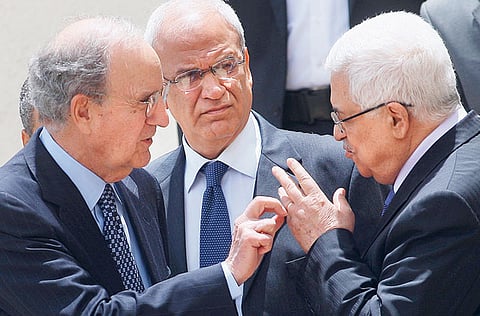EU envoy supports call for Israel colony freeze
Otte in Abu Dhabi to highlight UAE role in peace talks

Abu Dhabi: The EU's Special Representative for the Middle East Peace Process, Marc Otte, said Wednesday that he supports the Arab position that Israel freezes building of colonies in the occupied territories.
"The Palestinians can rightly say that they were promised by the US that Israeli [colonist] settlement activities would be frozen. You cannot negotiate about the state which is essentially a territory where one party is constantly reducing the area of the state," he said at a news conference.
"We have to stop a little bit to talk about what the state should be in terms of its institutions. By any definition, a state is a territory with a legitimate government, which has control over the people and the natural resources. That is the state. I think we have to stop fooling the Palestinians when we talk of defining the state's institutions before creating the state," Otte said.
He said the EU supports moving ahead from US-mediated proximity talks to direct talks between the Palestinians and Israelis
"The EU would like nothing better than direct talks between the Palestinians and Israelis right now," Otte told a news conference as Palestinian President Mahmoud Abbas is expected to meet US envoy George Mitchell to discuss final-status issues in indirect peace talks with Israel.
Common ground
He said the EU was working closely with the US to create more trust and more common grounds between the two sides.
Otte, on his third leg of a tour of the region which took him to Saudi Arabia and Bahrain, said he had talks with Dr Anwar Mohammad Gargash, UAE Minister of State for Foreign Affairs and 17 ambassadors of the EU member-countries in the UAE.
Otte said the EU's objective for the Middle East is clear and well established.
The group is pushing for a two-state solution with Israel and a democratic, viable, peaceful and sovereign Palestinian state existing side by side within secure and recognised borders, as well as a solution to the Israeli-Syrian and Israeli-Lebanese conflicts.
"The Israeli-Palestinian conflict lies at the heart of the problems in the region as a whole and must be resolved in order to bring about a comprehensive Middle East peace. This is vital not only for the region but also for us."
Seeking freedom
Otte said many Palestinians had asked him what is it about defining the institutions of their state before they have a state.
"The Palestinians seek freedom and independence first and the rest will be sorted out by themselves. I think It's a good idea to do both. But certainly, the political dimension should not be forgotten. It is about independence and putting an end of occupation. That's the reason why settlements are important. Not because they are an absolute colonisation in the words of Saudi officials. The land is important when you talk about a state. Even the Vatican has land to exist."
Shaikh Abdullah Bin Zayed Al Nahyan, UAE Foreign Minister, said recently the UAE and other Arab countries will not continue to support the proximity talks if Israel's construction of colonies continues unabated. Otte said his visit was meant to recognise "the important role the UAE have played and is continuing to play to create a favourable environment for the peace talks.
